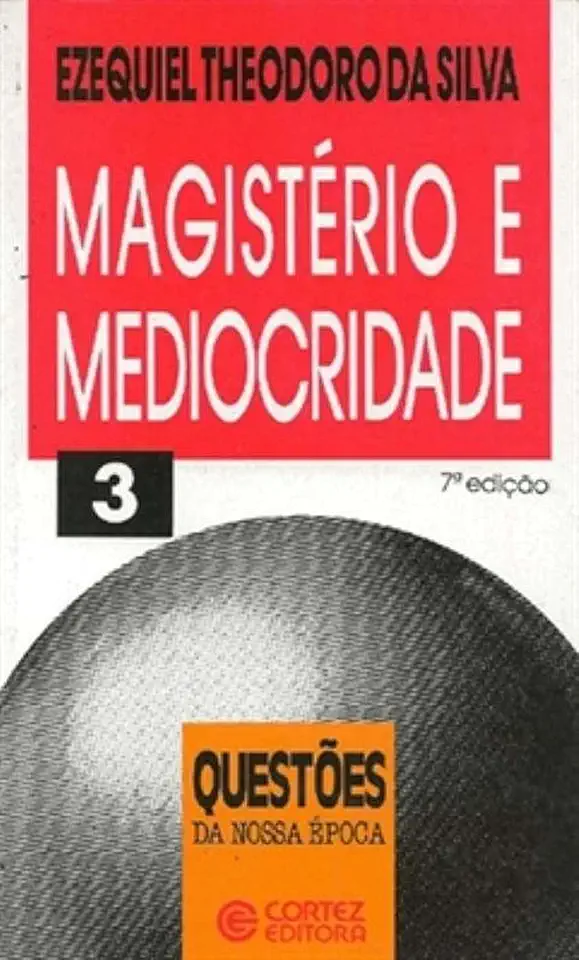
Teaching and Mediocrity - Ezequiel Theodoro da Silva
Teaching and Mediocrity: A Call for Excellence in Education
Introduction
In his groundbreaking book, "Teaching and Mediocrity," Ezequiel Theodoro da Silva presents a compelling argument for the urgent need to reform the education system and combat the pervasive mediocrity that plagues it. Drawing upon extensive research and real-world examples, Silva paints a vivid picture of the current state of education and the detrimental impact it has on students, teachers, and society as a whole.
The Problem: Mediocrity in Education
Silva begins by defining mediocrity as "the acceptance of low standards and the lack of striving for excellence." He argues that mediocrity has become deeply ingrained in the education system, manifested in various forms such as low expectations, inadequate teaching methods, and a lack of accountability. The consequences of this mediocrity are far-reaching, resulting in students who lack the skills and knowledge necessary for success in the 21st century workforce and a society that suffers from a decline in innovation and competitiveness.
The Causes of Mediocrity
Silva identifies several factors contributing to the prevalence of mediocrity in education. These include:
Low expectations: Many schools and teachers have low expectations for their students, believing that they are incapable of achieving high standards. This self-fulfilling prophecy creates a culture of mediocrity where students are not challenged to reach their full potential.
Inadequate teaching methods: Traditional teaching methods, such as rote memorization and lectures, are often ineffective in engaging students and fostering critical thinking skills. Teachers may lack the training and resources necessary to implement innovative and effective teaching strategies.
Lack of accountability: The education system often lacks accountability mechanisms to ensure that schools and teachers are meeting high standards. This allows mediocrity to persist without consequences, as there is little incentive for improvement.
The Consequences of Mediocrity
The consequences of mediocrity in education are far-reaching and detrimental to individuals and society as a whole. Some of the key consequences include:
Low student achievement: Students who are subjected to mediocre education are less likely to achieve academic success. They may lack the skills and knowledge necessary for success in college, the workforce, and life in general.
Decline in innovation and competitiveness: A mediocre education system produces a workforce that lacks the creativity, critical thinking, and problem-solving skills necessary for innovation and competitiveness in the global economy. This can lead to a decline in economic growth and prosperity.
Social inequality: Mediocrity in education exacerbates social inequality, as students from disadvantaged backgrounds are more likely to attend schools with low standards and inadequate resources. This perpetuates the cycle of poverty and limits opportunities for social mobility.
The Call for Excellence
In response to the challenges posed by mediocrity in education, Silva issues a passionate call for excellence. He argues that it is imperative to raise expectations, implement effective teaching methods, and establish accountability mechanisms to ensure that all students have access to high-quality education. Silva provides a roadmap for achieving excellence in education, emphasizing the importance of:
Setting high standards: Schools and teachers must set high expectations for all students and believe in their ability to achieve. This creates a positive learning environment that encourages students to strive for excellence.
Using effective teaching methods: Teachers should employ innovative and engaging teaching methods that foster critical thinking, problem-solving, and creativity. This requires ongoing professional development and a commitment to staying up-to-date with the latest educational research.
Establishing accountability: The education system must have strong accountability mechanisms to ensure that schools and teachers are meeting high standards. This includes regular assessments, transparent reporting of results, and consequences for underperforming schools.
Conclusion
"Teaching and Mediocrity" is a powerful and thought-provoking book that provides a comprehensive analysis of the current state of education and the urgent need for reform. Ezequiel Theodoro da Silva presents a compelling case for excellence in education, offering a roadmap for transforming the education system and ensuring that all students have the opportunity to reach their full potential. This book is a must-read for educators, policymakers, parents, and anyone concerned about the future of education and the well-being of our society.